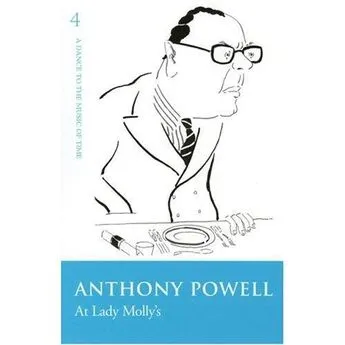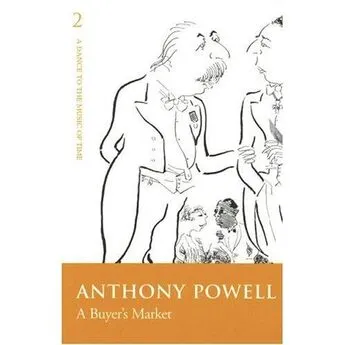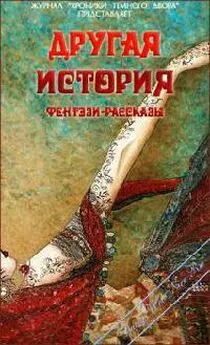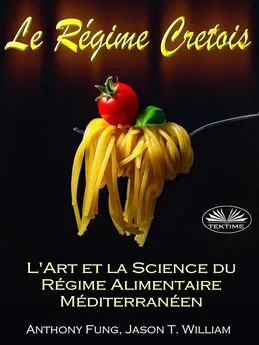Anthony Powell - At Lady Mollys
- Название:At Lady Mollys
- Автор:
- Жанр:
- Издательство:неизвестно
- Год:2005
- ISBN:нет данных
- Рейтинг:
- Избранное:Добавить в избранное
-
Отзывы:
-
Ваша оценка:
Anthony Powell - At Lady Mollys краткое содержание
A Dance to the Music of Time — his brilliant 12-novel sequence, which chronicles the lives of over three hundred characters, is a unique evocation of life in twentieth-century England.
The novels follow Nicholas Jenkins, Kenneth Widmerpool and others, as they negotiate the intellectual, cultural and social hurdles that stand between them and the “Acceptance World.”
At Lady Mollys - читать онлайн бесплатно полную версию (весь текст целиком)
Интервал:
Закладка:
‘Well,’ said Molly Jeavons, ‘I’ve known some undergraduates in my time — Jumbo, for instance, you should have seen him in his young days — but I’ve never met one who dressed like Hugo. I was talking to the Bridgnorths’ boy, John Mountfichet, when he was here the other day. He is at the same college as Hugo. He told us some things that would make your hair stand on end. They made Teddy laugh, and you know how difficult that is.’
‘Even Sillery says Hugo goes too far,’ said Lovell. ‘He drives all the other dons quite mad, of course, but I should have thought Sillery would have stuck up for him. The other undergraduates are very disapproving too. Apart from anything else, aesthetes have gone completely out of fashion at both universities these days. I told Hugo when I saw him the other day that he was hopelessly out of date.’
‘What did he say?’
‘“My dear, I love being dated . I hate all this bickering that goes on about politics. I wish I’d lived in the Twenties when people were amusing .”’
Lovell spoke the words with the mannerism he judged appropriate to such an impersonation.
‘He’ll grow out of it,’ said Mrs. Conyers, surprising me with this repeated display of toleration. ‘Lots of nice young men go through a stage of being rather silly.’
‘Let’s hope so,’ said Alfred Tolland, with a sigh.
He did not sound very confident.
‘At any rate, George is all right,’ he added a moment later.
I had the impression he was playing his last card, but that this card was a trump.
‘What is George Tolland doing now?’ I asked. ‘He was the one of the family who was my contemporary, though I never really knew him.’
‘In the Coldstream for some years,’ said Alfred Tolland. ‘Then he thought he ought to try and make some money, so he went into the City. He has done fairly well, so they say. Never know what people mean by that — but they say pretty well.’
‘Oh, yes,’ said Molly Jeavons. ‘I am sure that George has done well. But what a correct young man— what a correct young man ! I don’t think I ever met a young man who was so correct. I can’t see how we are ever going to get him married, he is so correct — and even if we found a correct wife for him, I am sure they would both be much too correct to have any children. And even if they did, what frightfully correct children they would have to be.’
‘You can’t have it both ways, Molly,’ grumbled Tolland. ‘You blame some of them for misbehaving themselves. Perhaps you are right. But then you don’t approve of George because he is what you call “correct”. Can’t understand it. There is no pleasing you. It isn’t reasonable.’
‘Well, now I’ll tell you about the rest of them,’ said Molly Jeavons, turning to me. ‘Of course I really adore them all, and just say these things to make Alfred cross. There is Susan, who is showing every sign of getting engaged to a nice young man, then there is Blanche—’
‘I’ve seen Blanche, though I don’t know her.’
‘Blanche is dotty. You must know that much, if you’ve seen her. But she’s not a bad old thing.’
‘Of course not.’
Alfred Tolland showed no disposition to deny the ‘dottiness’ of his niece, Blanche.
‘Robert is a bit of a mystery. He is in some business, but I don’t know whether he will stay there. Isobel — well, she is a bit different too. I’m not sure she isn’t going to get engaged soon herself. Then there is Priscilla, who is on the point of coming out, and was to have been here tonight, but she doesn’t seem to have turned up yet.’
I made an effort to take in this bird’s-eye view of the Tollands, who now seemed to surround me on all sides after this vivid exposition of their several characters. Instinctively, I felt the greatest interest in Isobel, who was ‘different’; and also an odd feeling of regret that she might be about to become engaged in the near future. While I was brooding on this, Jeavons joined us. He stood there, scanning everyone’s face closely, as if hoping for some explanation of the matter in hand; perhaps even of life itself, so intense was his concentration: some reasonable interpretation couched in terms simple enough for a plain man to understand without undue effort. He also gave the impression of an old dog waiting to have a ball thrown to retrieve, more because that was the custom in the past than because sport or exercise was urgently required. However, no one enlightened him as to the subject under discussion, so he merely filled up my glass, and then his own. His wife and Alfred Tolland had now embarked on some detailed aspect of Tolland life, too esoteric for an outsider to follow.
‘In the film business like Chips?’ Jeavons asked, in a low husky voice, as if he had a cold coming on, or had drunk too much whisky the night before.
‘Yes.’
‘Ever met any of the stars?’
‘Not so you’d notice. I’m on the scenario side. The studio only makes English pictures for the quota. They wouldn’t be likely to employ anyone very grand in the way of an actor or actress.’
Jeavons seemed disappointed at this answer.
‘Still,’ he urged, ‘you must see some beauties sometimes, don’t you?’
‘I’ve sat next to Adolph Menjou,’ said his wife, suddenly abandoning the subject of the Tollands, and breaking in with her accustomed violence, though not, I think, with any idea of preventing him from pursuing the question of film actresses and their looks. ‘He had such nice manners. Of course Garbo is the one I should really like to meet. I suppose everyone would. Wouldn’t you like to meet Garbo, Alfred?’
‘Never heard of him,’ said Tolland.
Inevitably there was some laughter at this.
‘It’s a she ,’ said Molly Jeavons. ‘It’s a she , Alfred.’
‘An actress, I suppose,’ said Tolland, ‘or you wouldn’t be using that tone of voice. I don’t think I particularly want to meet Miss Garbo — or perhaps it is Mrs. Garbo.’
There was more laughter at that. I was not sure — I am not sure to this day — whether he was feigning ignorance of the famous film star, whose name at that moment, the zenith of her fame, was a synonym for mysterious, elusive, feminine beauty; or whether he had, in truth, never heard of her.
‘I once met Mrs. Patrick Campbell when I was a young man,’ he said, speaking as if the statement was an afterthought. ‘Heard her read aloud High Tide on the Coast of Lincolnshire . Wonderful experience. Felt different all the evening. Couldn’t sleep after it. Lay awake — well — till the morning, nearly.’
Possibly Molly Jeavons felt that for a brief second the tables had been turned on her, because she now returned to the charge in the game of baiting him about his family, probably feeling in that activity on safer ground.
‘Tell us more about the stained-glass window, Alfred,’ she said.
This request galvanised him once again to the point of anger. She seemed to have touched some specially sensitive nerve.
‘I’ve told you already, Molly,’ he said, ‘the window has never been put up as it should have been. Erridge isn’t interested.’
‘Surely somebody in the family can tell him to do it,’ she said. ‘Why can’t you tell him to get on with the job yourself? He must do it, that’s all.’
She spoke as if her own decision made the matter final. Alfred Tolland shook his head gloomily.
‘As well ask him to lead the glass himself,’ he said. ‘Better, in fact. He might have a try at that. Dignity of labour or something. But as for taking an interest in his own grandfather’s memorial —’
Tolland shook his head, finding metaphor, as applied to Erridge, impotent.
‘Can’t George take it on?’ insisted Molly Jeavons. ‘You think so highly of George.’
Tolland shook his head again.
‘Difficult for George,’ he said. ‘Delicate, with Erridge the eldest son. George doesn’t want to be snubbed.’
‘Oh, goodness,’ said Molly Jeavons, throwing up her hands, ‘you Tollands drive me mad.’
Some new guests came into the room at that moment, so that her own plan for solving the problem of the stained-glass window was never revealed. In the reshuffle of places, I found myself tête-à-tête with Mrs. Conyers. After a few preliminary enquiries about my parents, she explained that the General was indisposed, though not seriously, having fallen headlong from the stable loft where the poodles’ food was stored. He must at that time have been a few years short of eighty.
‘But I did not remember you knew Lady Molly,’ said Mrs. Conyers in a low voice.
‘I did not, until tonight.’
‘Rather a happy-go-lucky household. That very extraordinary butler. One does not know what is going to be said next.’
‘So I should think.’
‘Too much so for me. I am old-fashioned, I’m afraid. I do not at all mind admitting it.’
I was reminded of Hugo Tolland, said to like being ‘dated’, but thought it wiser not to remind Mrs. Conyers of the parallel. I wondered why she had agreed to dine with the Jeavonses if she felt so inimical to them.
‘But you yourself must have known Lady Molly for a long time?’
‘Of course we have known her for years and years. But never well. When she was Lady Sleaford my youngest sister, Mildred, knew her, and we used to meet sometimes. I have hardly seen her since her second marriage. We know the present Sleafords, but I don’t think Lady Molly ever sees anything of them. That is to be expected, perhaps.’
‘You dined here?’
‘It was really on account of my sister. I can’t remember whether you have ever met Mildred.’
‘Only when I was a child. When you showed me the sword the sultan gave the General.’
Mrs. Conyers smiled.
‘That was a long time ago,’ she said. ‘Then you really do not know her.’
Some of the subsequent history of Mildred Blaides was, in fact, familiar to me from occasional talk on the part of my parents. Considered rather ‘fast’ in her early days — as might be expected from my memory of her — she had married a Flying Corps officer called M’Cracken, who had been killed not long after the wedding in a raid over Germany. Then there had been a period of widowhood, when her behaviour had been thought ‘flighty’. From the manner in which this interlude in her career used to be discussed, I imagine that my parents’ generation supposed her to be about to go to the bad in a spectacular manner. However, this very generally prophesied débâcle never took place. Mildred Blaides married again: the second time to an Australian business-man, a Mr. Haycock, retired, fairly rich, who owned a villa in the South of France and spent a good deal of his time travelling round the world. Mr. Haycock, who was said to possess sterling virtues in addition to his comfortable income, was also agreed to be ‘rather rough’. The marriage, so far as I knew, had been quite a success. There were children, but I did not know how many.
‘As a matter of fact, my sister Mildred is a very old friend of our hostess,’ said Mrs. Conyers, as if the matter was weighing on her mind. ‘As I say, she knows Lady Molly far better than I do. Mildred nursed at Dogdene during the war.’
‘I remember her in nurse’s uniform.’
‘She is coming here tonight. She was to have dined, but at the last moment she was unable to be at dinner. She is — more or less engaged to a friend of Lady Molly’s. As I expect you know, Mildred’s husband died about a year ago. Unfortunately a business engagement prevented her — I suppose I should say — fiancé from dining. He is a very busy man. He just could not get away tonight in Ume. Then Mildred herself is always changing her plans. Goodness knows why she herself could not come here without him. However, she couldn’t, so there it was. They are both looking in later.’
Читать дальшеИнтервал:
Закладка:








